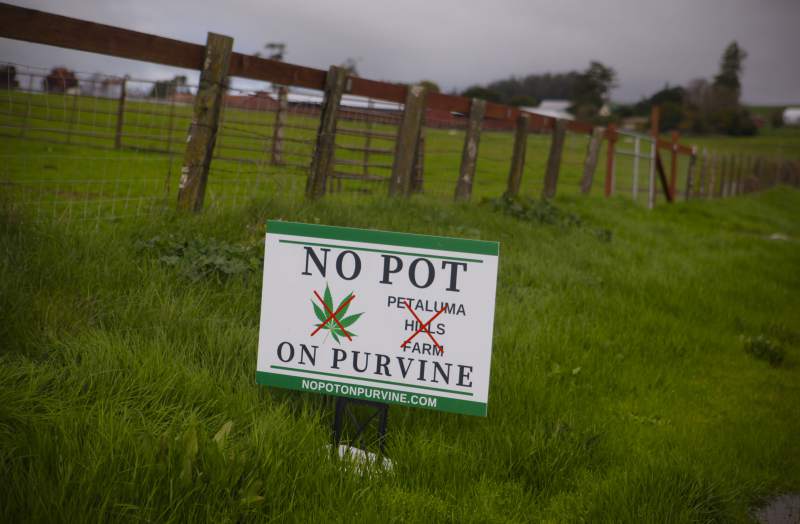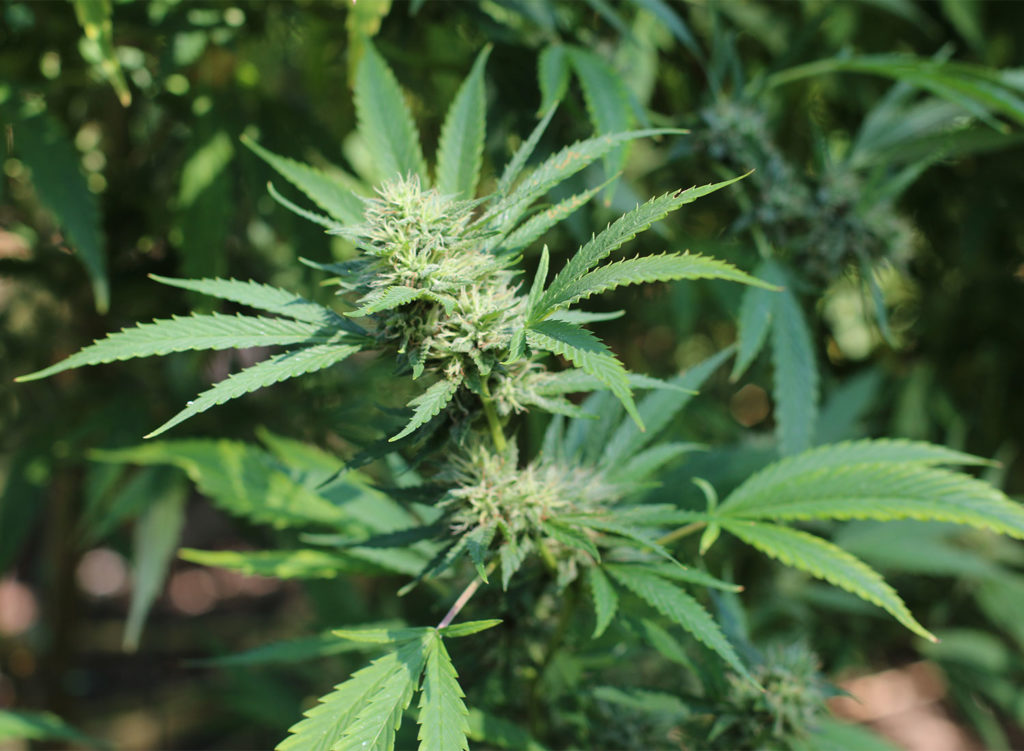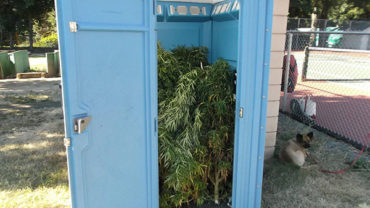A Petaluma-area cannabis cultivation company whose neighbors filed a lawsuit alleging noxious odors and noise will cease operations after harvest, following a deal with Sonoma County’s code enforcement unit.
The tentative agreement includes a provision that the owner of the property who leased land to marijuana grower Carlos Zambrano and his company, Green Earth Co., will amend the deed to bar commercial cannabis cultivation from taking place on the 15-acre Adobe Road parcel in perpetuity. The prohibition will continue regardless of ownership changes, according to Maggie Fleming, spokeswoman with Sonoma County’s permit department.
The outcome is a boon for the neighbors living on Herrerias Way east of Petaluma who banded together to sue Green Earth using a little-known civil portion of the federal Racketeer-Influenced and Corrupt Organization, or RICO, Act to stop cannabis cultivation on the vineyard property. They argued the plants, grown on the property starting about April, were too close to residents and the smell caused health problems for the neighborhood.
“Ultimately, we got a good result, but it wasn’t fast enough for my clients,” said Kevin Block, a Napa-based attorney representing the four Herrerias Way families suing Zambrano and Green Earth.
Zambrano and Green Earth did not have a state cultivation license and had applied to receive a county cultivation permit. In May, county code enforcement officers ordered they halt all marijuana farming, which the company appealed. Zambrano and Green Earth were facing more than $1 million in penalties for violations of the cannabis ordinance and building codes.
Friday’s draft agreement was announced at a morning hearing in Sonoma County’s permitting department to address Green Earth’s appeal. Instead, lawyers for the county and Green Earth notified the hearing officer the company will halt all cultivation by Nov. 1 and all cannabis-related activities from the property by Nov. 15, according to Fleming. A final draft of the agreement will be submitted within seven days, and it will include how much of the $1 million in fines the company must pay.
“They are going to have to move, however they are able to complete their current cultivation operation that’s happening now, and that’s significant for them,” said Joe Rogoway, an attorney for Zambrano and Green Earth.
Zambrano was out of the country and unavailable for comment, according to Rogoway.
Rogoway defended his client’s intentions and the company’s attempt to lawfully operate a cannabis cultivation project in Sonoma County. A county tax collection official said Green Earth paid $53,696.28 in taxes for the 2017-2018 tax year.
Rogoway said Zambrano “is just a regular guy” who took a risk by trying to cultivate cannabis in the county. He called Sonoma County’s cannabis ordinance “a systemic failure” that has created a system in which “everyone loses.”
“Probably 95 percent of the cultivators in Sonoma County are not able to avail themselves of the (county’s cannabis) program, and are not able to stay here,” Rogoway said. “Regardless of this particular settlement, the county’s program is a failure; it’s a debacle.”
Tyra Harrington, Sonoma County’s code enforcement manager, said Green Earth was growing more than 5,000 plants on about 1 acre of land, and had failed to acquire the needed permits for the 40 greenhouse structures, a cargo container and electrical infrastructure. She said the company also didn’t complete paperwork needed to acquire county permission to grow marijuana.
“The county has spent almost two years trying to educate cannabis operators how to come into compliance with county codes,” Harrington said. “In this particular case, (Green Earth) didn’t, and they opened up operations anyway.”
The Herrerias Way plaintiffs — Stefan and Carol Bokaie, Surinder and Marie Uppal and their son, Gurjiwan Uppal; Brenda and Patrick Ward; and Neera and Sandeep Bhandari — decided to file the federal lawsuit, unprecedented in California, after feeling the county was taking to long to shut down the farm.
But Harrington defended the county’s process for addressing unregulated cannabis cultivation and code violations, and said they must give each entity due process required by state and local laws. The county’s code enforcement division has received about 680 complaints related to cannabis activities since January 2017, and they have addressed more than 600 of those complaints either through getting people to comply with the rules or shutting them down.
The 15-acre vineyard property is zoned for what’s called “diverse agriculture” and is an eligible site for cannabis cultivation until the deed is changed.
The property is owned by a limited liability company, Flying Rooster, which already was in discussions with the county to add a deed restriction barring commercial cannabis cultivation on the land when the neighbors Monday filed their lawsuit, which also named Flying Rooster, according to the company’s Healdsburg-based attorney Bert Terreri.
“It all came as quite a surprise to the landowner,” Terreri said.
The Adobe Road property runs along the backyards of four estates on Herrerias Way, and the families that live there alleged in their lawsuit that the strong smell of marijuana created significant health concerns, such as worsened asthma, and led them to stop spending time outside of their homes.
Block, their attorney, said that once Green Earth’s settlement with the county is finalized and they see the terms in writing, they will discuss whether to continue pursuing the racketeering lawsuit. Block said that they are interested to see how much the county has discounted their penalty fees.
“Doesn’t this say to the illegal guys, you can go in and get your harvest fast before the county does anything and then move on?” Block said. “The legitimate growers should be standing shoulder-to-shoulder with these neighbors because we all lose by these fly-by-night operators.”
You can reach Staff Writer Julie Johnson at 707-521-5220 or julie.johnson@pressdemocrat.com. On Twitter @jjpressdem.










